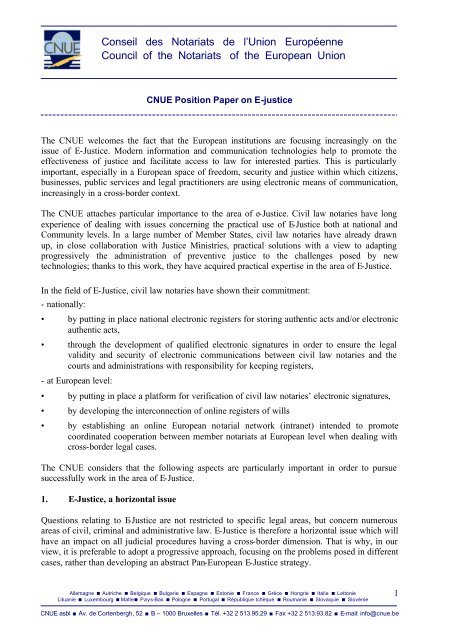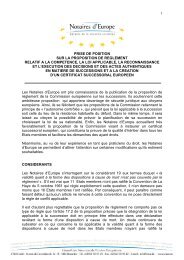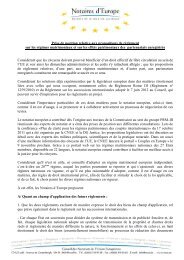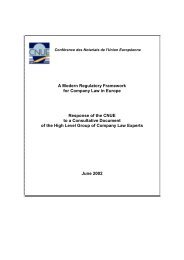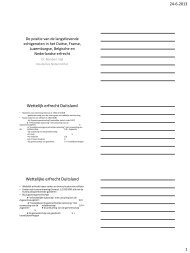CNUE Position Paper on E-justice ( 10 October 2008 ) PDF
CNUE Position Paper on E-justice ( 10 October 2008 ) PDF
CNUE Position Paper on E-justice ( 10 October 2008 ) PDF
Create successful ePaper yourself
Turn your PDF publications into a flip-book with our unique Google optimized e-Paper software.
C<strong>on</strong>seil des Notariats de l’Uni<strong>on</strong> EuropéenneCouncil of the Notariats of the European Uni<strong>on</strong><str<strong>on</strong>g>CNUE</str<strong>on</strong>g> <str<strong>on</strong>g>Positi<strong>on</strong></str<strong>on</strong>g> <str<strong>on</strong>g>Paper</str<strong>on</strong>g> <strong>on</strong> E-<strong>justice</strong>The <str<strong>on</strong>g>CNUE</str<strong>on</strong>g> welcomes the fact that the European instituti<strong>on</strong>s are focusing increasingly <strong>on</strong> theissue of E-Justice. Modern informati<strong>on</strong> and communicati<strong>on</strong> technologies help to promote theeffectiveness of <strong>justice</strong> and facilitate access to law for interested parties. This is particularlyimportant, especially in a European space of freedom, security and <strong>justice</strong> within which citizens,businesses, public services and legal practiti<strong>on</strong>ers are using electr<strong>on</strong>ic means of communicati<strong>on</strong>,increasingly in a cross-border c<strong>on</strong>text.The <str<strong>on</strong>g>CNUE</str<strong>on</strong>g> attaches particular importance to the area of e-Justice. Civil law notaries have l<strong>on</strong>gexperience of dealing with issues c<strong>on</strong>cerning the practical use of E-Justice both at nati<strong>on</strong>al andCommunity levels. In a large number of Member States, civil law notaries have already drawnup, in close collaborati<strong>on</strong> with Justice Ministries, practical soluti<strong>on</strong>s with a view to adaptingprogressively the administrati<strong>on</strong> of preventive <strong>justice</strong> to the challenges posed by newtechnologies; thanks to this work, they have acquired practical expertise in the area of E-Justice.In the field of E-Justice, civil law notaries have shown their commitment:- nati<strong>on</strong>ally:• by putting in place nati<strong>on</strong>al electr<strong>on</strong>ic registers for storing authentic acts and/or electr<strong>on</strong>icauthentic acts,• through the development of qualified electr<strong>on</strong>ic signatures in order to ensure the legalvalidity and security of electr<strong>on</strong>ic communicati<strong>on</strong>s between civil law notaries and thecourts and administrati<strong>on</strong>s with resp<strong>on</strong>sibility for keeping registers,- at European level:• by putting in place a platform for verificati<strong>on</strong> of civil law notaries’ electr<strong>on</strong>ic signatures,• by developing the interc<strong>on</strong>necti<strong>on</strong> of <strong>on</strong>line registers of wills• by establishing an <strong>on</strong>line European notarial network (intranet) intended to promotecoordinated cooperati<strong>on</strong> between member notariats at European level when dealing withcross-border legal cases.The <str<strong>on</strong>g>CNUE</str<strong>on</strong>g> c<strong>on</strong>siders that the following aspects are particularly important in order to pursuesuccessfully work in the area of E-Justice.1. E-Justice, a horiz<strong>on</strong>tal issueQuesti<strong>on</strong>s relating to E-Justice are not restricted to specific legal areas, but c<strong>on</strong>cern numerousareas of civil, criminal and administrative law. E-Justice is therefore a horiz<strong>on</strong>tal issue which willhave an impact <strong>on</strong> all judicial procedures having a cross-border dimensi<strong>on</strong>. That is why, in ourview, it is preferable to adopt a progressive approach, focusing <strong>on</strong> the problems posed in differentcases, rather than developing an abstract Pan-European E-Justice strategy.Allemagne < Autriche < Belgique < Bulgarie < Espagne < Est<strong>on</strong>ie < France < Grèce < H<strong>on</strong>grie < Italie < Lett<strong>on</strong>ieLituanie < Luxembourg
C<strong>on</strong>seil des Notariats de l’Uni<strong>on</strong> EuropéenneCouncil of the Notariats of the European Uni<strong>on</strong>2. A bottom-up approach: promoting examples of best practicesThe Community work initiated in the field of E-Justice should not in principle require theMember States to introduce new electr<strong>on</strong>ic systems at nati<strong>on</strong>al level or to make fundamentalchanges to the elements that they have put in place at nati<strong>on</strong>al level. C<strong>on</strong>sequently, the <str<strong>on</strong>g>CNUE</str<strong>on</strong>g>agrees with the Commissi<strong>on</strong> and c<strong>on</strong>siders that there is no need to introduce new Communitymeasures in this area for now. On the c<strong>on</strong>trary, it is more a questi<strong>on</strong> of facilitating and above allpromoting effective cross-border communicati<strong>on</strong> between the Justice bodies and, if applicable,citizens, in compliance with nati<strong>on</strong>al and Community provisi<strong>on</strong>s in force.To that end, it is important, in our view, to study nati<strong>on</strong>al and European E-Justice applicati<strong>on</strong>swhich have already proved their practical worth and, if applicable, to promote and develop themin a targeted way at Community level as examples of best practices. In this c<strong>on</strong>text, the <str<strong>on</strong>g>CNUE</str<strong>on</strong>g>wishes to refer in particular to European notarial projects aimed at interc<strong>on</strong>necting nati<strong>on</strong>alregisters of wills as well as those c<strong>on</strong>cerning the verificati<strong>on</strong> of electr<strong>on</strong>ic signatures.In additi<strong>on</strong>, this will involve defining interfaces with nati<strong>on</strong>al systems and developingcommunicati<strong>on</strong> standards. This definiti<strong>on</strong> could help and guide above all the Member Stateswhich in any event intend to modernise their systems and which, to that end, want to availthemselves straightaway of European possibilities.3. Scope of applicati<strong>on</strong> of E-Justicea) Cross-border casesCommunity work in the area of E-Justice should cover <strong>on</strong>ly cross-border cases. Purely internalprocedures should not fall within the immediate scope of applicati<strong>on</strong> of European E-Justiceinitiatives.b) Material scope of applicati<strong>on</strong>aa) European Judicial PortalThe <str<strong>on</strong>g>CNUE</str<strong>on</strong>g> welcomes the efforts made to establish a single, central judicial portal at Communitylevel. For numerous nati<strong>on</strong>al E-Justice projects, such a judicial portal would at the same timeserve as a basis for successful cross-border communicati<strong>on</strong> between the registers and/or betweenMember States relying <strong>on</strong> modern informati<strong>on</strong> technologies. The soluti<strong>on</strong>s found or that need tobe found in this c<strong>on</strong>text (for example, as regards problems relating to identificati<strong>on</strong>, technicalstandards, linguistic diversity, etc.) may then be applied to other questi<strong>on</strong>s to be examinedsubsequently. Thus, experiments c<strong>on</strong>ducted <strong>on</strong> servers for verificati<strong>on</strong> of electr<strong>on</strong>ic signaturesand <strong>on</strong> the European network of registers of wills, presented to the Council, the Commissi<strong>on</strong> andto E-Justice c<strong>on</strong>ferences, may enable progress to be made.As regards the design of the portal’s c<strong>on</strong>tent, the <str<strong>on</strong>g>CNUE</str<strong>on</strong>g> proposes to integrate the work of thoseinvolved in preventive <strong>justice</strong>, such as civil law notaries, and in particular the European NotarialNetwork.Allemagne < Autriche < Belgique < Bulgarie < Espagne < Est<strong>on</strong>ie < France < Grèce < H<strong>on</strong>grie < Italie < Lett<strong>on</strong>ieLituanie < Luxembourg
C<strong>on</strong>seil des Notariats de l’Uni<strong>on</strong> EuropéenneCouncil of the Notariats of the European Uni<strong>on</strong>bb) Networking of public registersPublic registers are increasingly kept in electr<strong>on</strong>ic form, such as for example criminal records,land registers, trade registers, registers of levies of executi<strong>on</strong>, insolvency registers and registers ofwills. In this c<strong>on</strong>text, it is necessary to take into account the extent to which the data stored insuch registers are c<strong>on</strong>sidered as sensitive data and the c<strong>on</strong>diti<strong>on</strong>s of access to which they aresubject because of various stipulati<strong>on</strong>s of the law of the Member States.In criminal matters, the pilot project for the networking of nati<strong>on</strong>al criminal records is of utmostimportance, as noted by the Commissi<strong>on</strong>. In civil matters, the pilot project for networkingregisters of wills is essential for European citizens who find themselves moving increasinglywithin the European Uni<strong>on</strong>, which is not without problems relating to successi<strong>on</strong>. These twoprojects which, meanwhile, are now in the operati<strong>on</strong>al phase with the exchange of electr<strong>on</strong>ic data,dem<strong>on</strong>strate that European informati<strong>on</strong> systems <strong>on</strong> <strong>justice</strong> can operate <strong>on</strong> the basis of anagreement relative to nati<strong>on</strong>al interfaces and comm<strong>on</strong> arrangements with regard tocommunicati<strong>on</strong> standards, without changing fundamentally nati<strong>on</strong>al computer systems. It isimportant therefore to capitalise <strong>on</strong> the experience gained from these projects for future projectsinvolving electr<strong>on</strong>ic communicati<strong>on</strong> between other nati<strong>on</strong>al registers.The work <strong>on</strong> E-Justice could also cover the networking of trade registers, business directories andland registers.c) Data securityThe correct working of registers involves precise c<strong>on</strong>trols over the c<strong>on</strong>tent of entries in theregister. In this regard, in most EU countries, civil law notaries, in their capacity as anintermediary between the registers and interested parties, ensure that documents intended for theregister are correctly prepared. During these procedures, civil law notaries check the identity ofparties wanting to make an entry as well as the legality of their declarati<strong>on</strong>s, thus protecting theparties c<strong>on</strong>cerned from err<strong>on</strong>eous entries. L<strong>on</strong>g and costly research into the accuracy andreliability of publicati<strong>on</strong>s in the registers is thus avoided. In this way, civil law notaries make asubstantial c<strong>on</strong>triti<strong>on</strong> to relieving c<strong>on</strong>gesti<strong>on</strong> in the courts.In order to avoid seriously undermining the working of the system of registers, it is important toprotect and ensure the security of data. This applies not <strong>on</strong>ly as regards the creati<strong>on</strong> of electr<strong>on</strong>icaccess to the c<strong>on</strong>tent of registers, so that <strong>on</strong>ly authorised parties have access to the relevant data,but also and above all as regards the electr<strong>on</strong>ic transfer of informati<strong>on</strong> to the services resp<strong>on</strong>siblefor keeping registers. In this regard, it is a matter of making exchange platforms secure. To dothat, it is necessary to apply appropriate identificati<strong>on</strong> technologies.A major challenge to be met in order to ensure the efficient use of E-Justice bey<strong>on</strong>d nati<strong>on</strong>alfr<strong>on</strong>tiers is therefore to develop standards or standard interfaces in order to be able to applyidentificati<strong>on</strong> technologies and the comp<strong>on</strong>ents of electr<strong>on</strong>ic signatures.The aim would be to determine, <strong>on</strong> the basis of the results and experience acquired, how toexchange in c<strong>on</strong>crete terms electr<strong>on</strong>ic informati<strong>on</strong> between countries. This exchange must beaccomplished so as to ensure maximum efficiency and data security. By way of example, theAllemagne < Autriche < Belgique < Bulgarie < Espagne < Est<strong>on</strong>ie < France < Grèce < H<strong>on</strong>grie < Italie < Lett<strong>on</strong>ieLituanie < Luxembourg
C<strong>on</strong>seil des Notariats de l’Uni<strong>on</strong> EuropéenneCouncil of the Notariats of the European Uni<strong>on</strong><str<strong>on</strong>g>CNUE</str<strong>on</strong>g> wishes to draw attenti<strong>on</strong> to the European project <strong>on</strong> the verificati<strong>on</strong> of electr<strong>on</strong>icsignatures used in a cross-border framework.E-Justice will <strong>on</strong>ly be able to create real added value for citizens, businesses and legalpractiti<strong>on</strong>ers if the possibilities of modern communicati<strong>on</strong>s technologies can be combined withneeds c<strong>on</strong>cerning legal certainty in the area of transacti<strong>on</strong>s and the protecti<strong>on</strong> of the authenticityand integrity of informati<strong>on</strong> transmitted. European civil law notaries are committed to making anactive c<strong>on</strong>tributi<strong>on</strong> to E-Justice and therefore stress their availability to share the experience theyhave acquired in this area.***Council of the Notariats of the European Uni<strong>on</strong>Brussels, <strong>10</strong> <strong>October</strong> <strong>2008</strong>Allemagne < Autriche < Belgique < Bulgarie < Espagne < Est<strong>on</strong>ie < France < Grèce < H<strong>on</strong>grie < Italie < Lett<strong>on</strong>ieLituanie < Luxembourg


